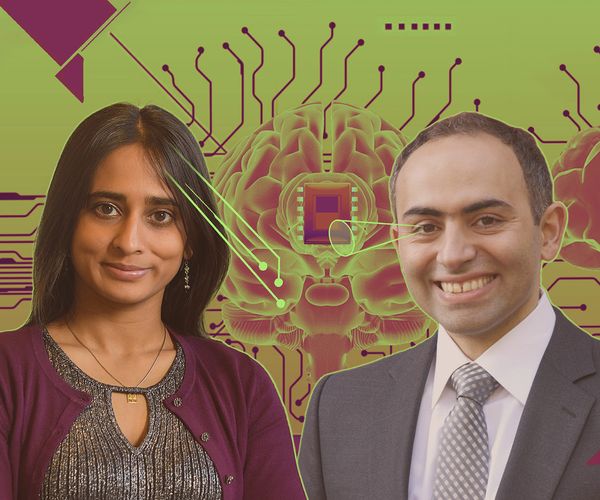The Brain Trust’s Newest Additions
by Allison Kleber
They’re each the picture of a “societal engineer,” and they’d really like to get into your head.
That is, if there’s one thing that newly-minted ECE Professors Archana Venkataraman and Kayhan Batmanghelich have in common, it’s a passion for putting their computational expertise to bear on improving healthcare; neurological and otherwise. The department is thrilled to welcome them into our scholarly community for their inaugural semester.
Associate Professor Venkataraman joins Boston University from the Johns Hopkins Whiting School of Engineering; she earned her PhD from the Massachusetts Institute of Technology in 2012. Her Neural Systems Analysis Laboratory (NSA Lab) is dedicated to building a comprehensive, system-level understanding of the brain; an essential foundation for improving patient care and, in particular, the treatment of debilitating neurological disorders. Venkataraman’s methodology incorporates a variety of computational methods, such as machine learning, signal processing, and network theory, with application-driven hypotheses about brain functionality. With research support from the NIH and NSF, including an NSF CAREER Award, under her belt, in addition to numerous awards and accolades, six years on the Johns Hopkins faculty, and postdoctoral work at MIT and the Yale School of Medicine, she is already an accomplished researcher and educator.
In spite of his playfully-titled Batman Lab, Assistant Professor Batmanghelich is no dark horse; his research into algorithmic analysis of medical data has earned broad support from the NIH, NSF, and sponsors in industry, and he is the co-founder of a multi-institutional virtual seminar series on ML methodology in healthcare (MLxMed), and a start-up focused on ML-based realtime evaluation of adverse events during surgery (READE.ai). Batmanghelich’s work encompasses AI/ML, bioinformatics, and medical vision (medical image analysis), with projects focused on neurodegenerative diseases (such as Alzheimer’s) and lung diseases (Chronic Obstructive Pulmonary Disease, or COPD, for example). Prior to joining ECE, he was a member of the faculty of Biomedical Informatics at the University of Pittsburgh from 2016-2022; he received his PhD from the University of Pennsylvania in 2012 and held a postdoctoral post at MIT’s Computer Science and Artificial Intelligence Lab (CSAIL).
Both Associate Professor Venkataraman and Assistant Professor Batmanghelich are rising stars, and the Department of Electrical and Computer Engineering is looking forward to their contributions and excited to have them on board.
